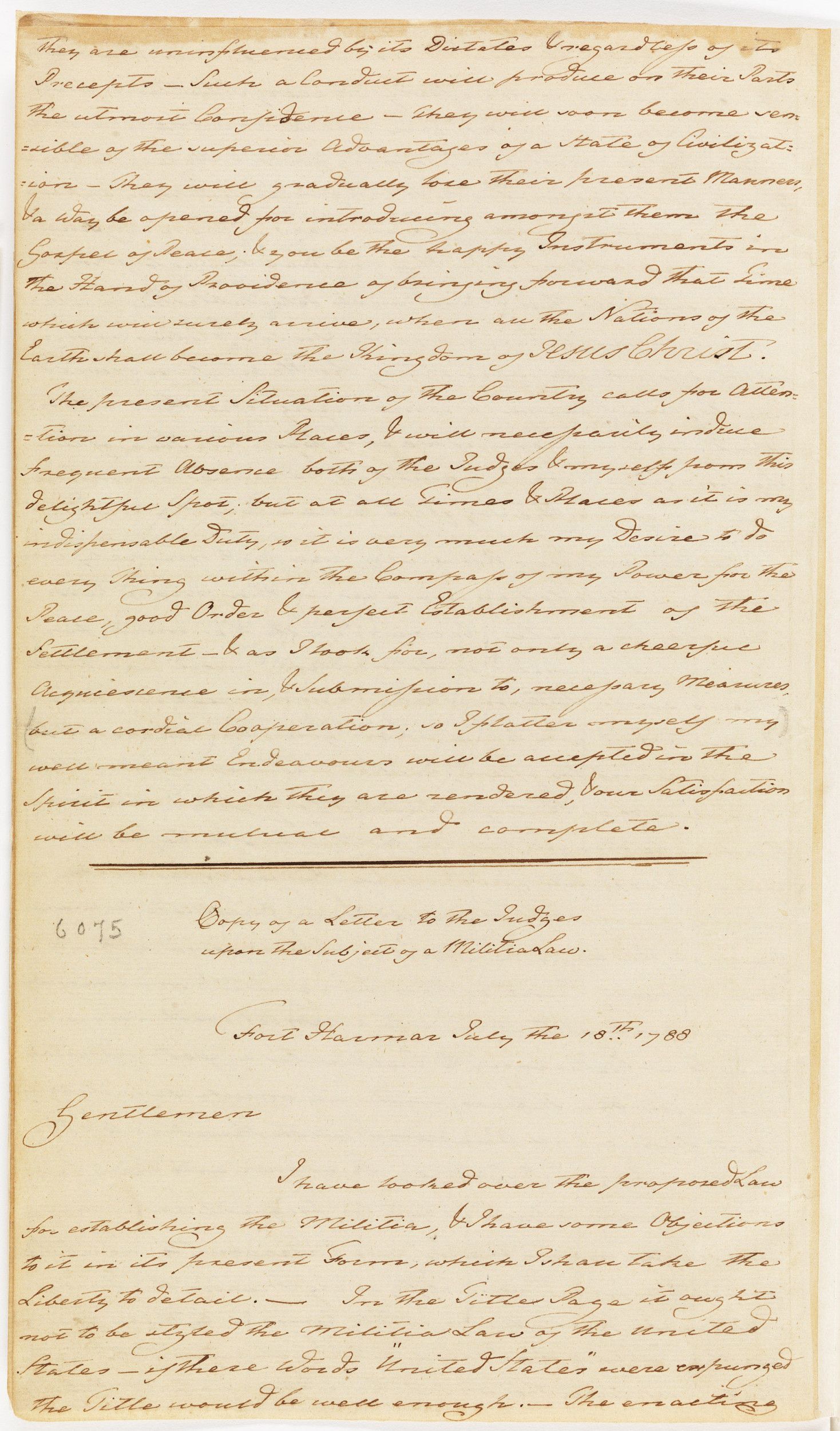Indian Nations vs. Settlers on the American Frontier: 1786–1788
Focusing on Details: Compare and Contrast
All documents and text associated with this activity are printed below, followed by a worksheet for student responses.Introduction
Carefully read the following two important historical documents. Try to figure out what each writer was trying to say and the problem they were trying to figure out. Pay attention to the time period and geographic location of the speakers and make a note of who was speaking or writing. At the time there were “disturbances” on both sides of the Ohio River between the Natives and the settlers who were moving onto what had been Indian land. Also, there had been a change in ruling power from England to the United States as a result of the Revolutionary War.Note: For a transcript of each document, click on View Entire Document below the image. On the page that opens, scroll down and click on Show Transcript.
Name:
Class:
Class:
Worksheet
Indian Nations vs. Settlers on the American Frontier: 1786–1788
Focusing on Details: Compare and Contrast
Examine the documents included in this activity and write your response in the space provided.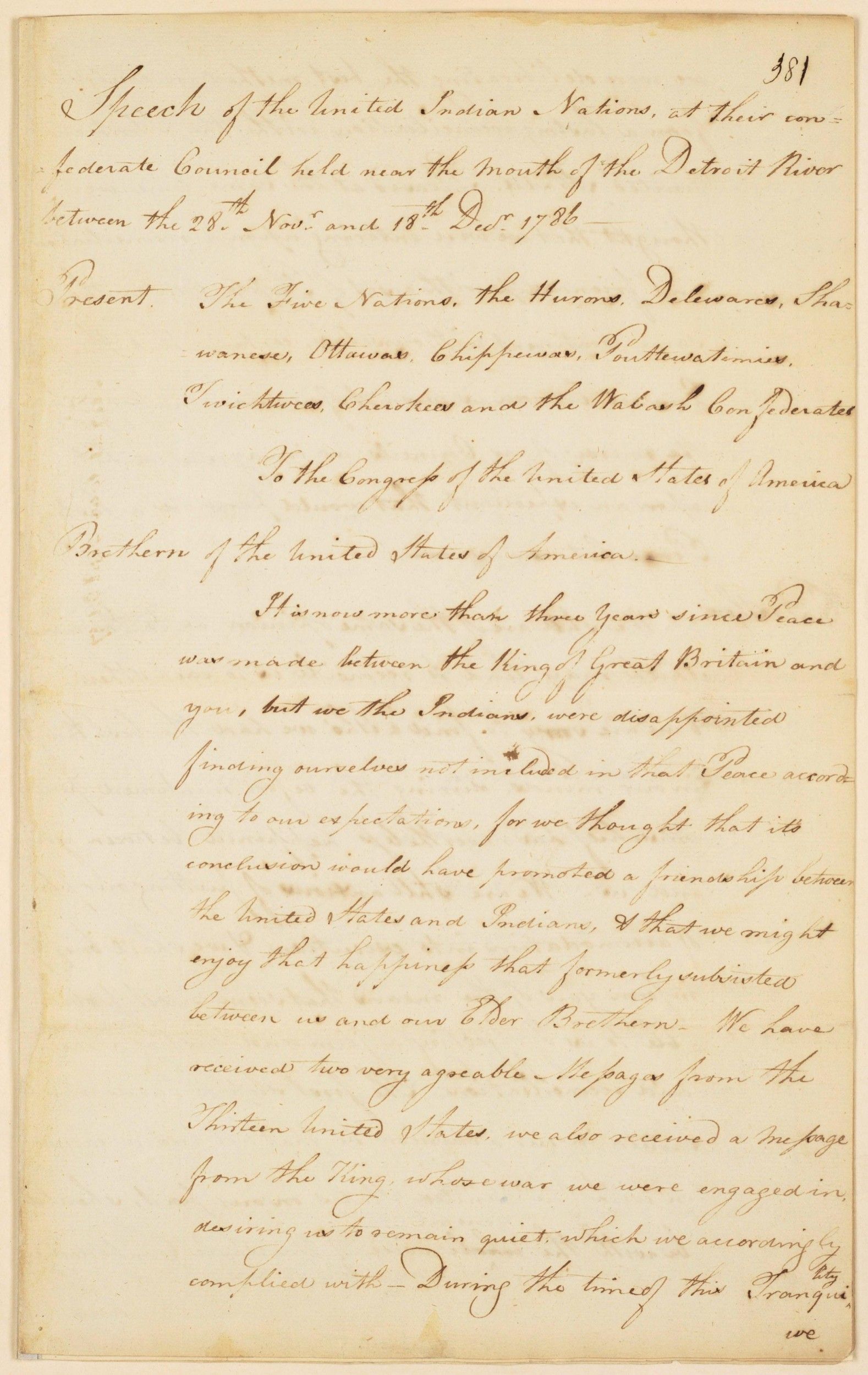
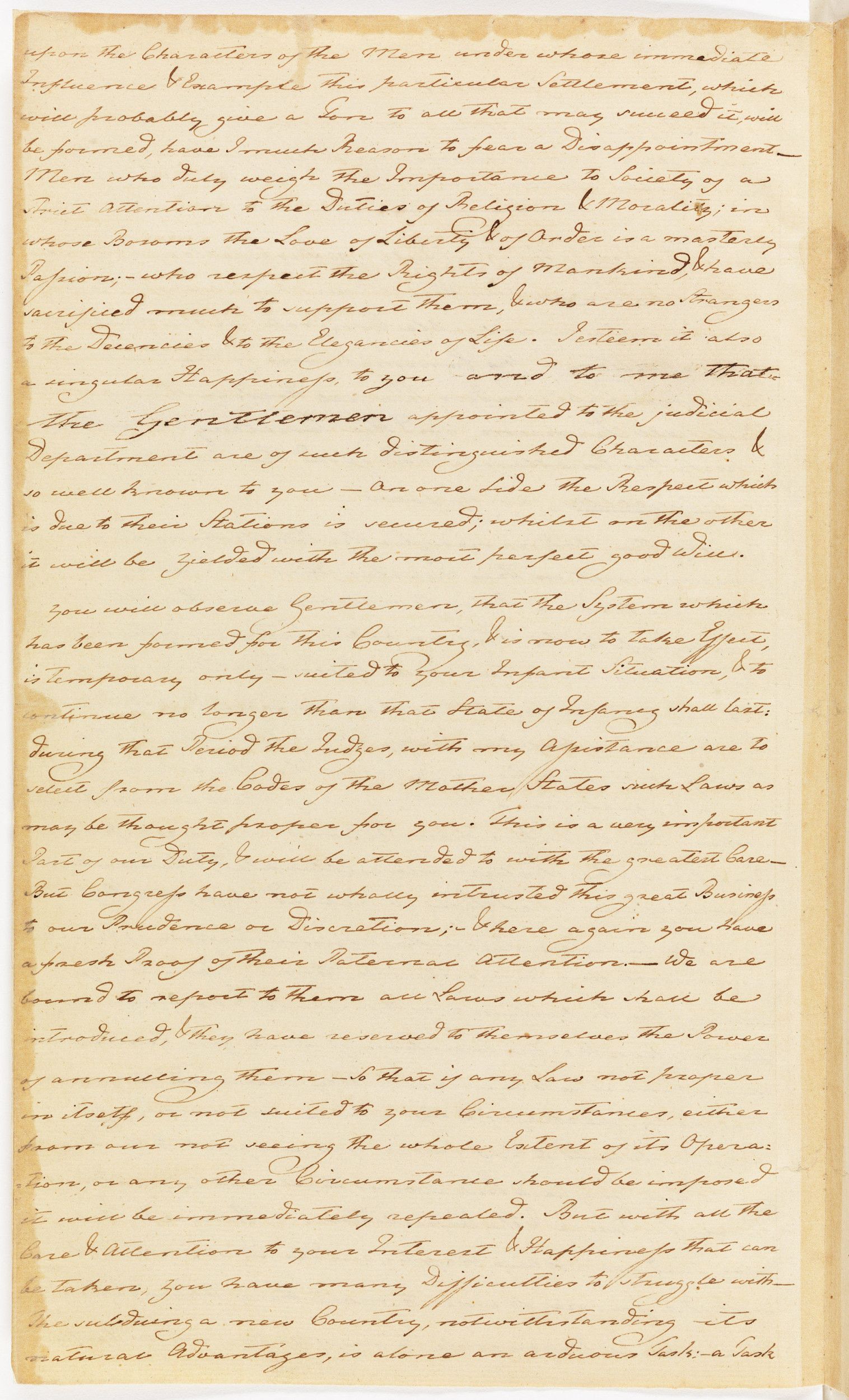
These are two important historical documents written in 1786 and 1788.
- The first document is written by a combined group of several Native American tribes. Each tribe was considered by both Great Britain and the US to be an “independent nation” at the time … something like a small, independent country. In 1768, this same united group of tribes had been party to an earlier treaty with Great Britain called the Treaty of Fort Stanwix.
- The second document is written by the Governor and Commander in Chief of the Northwest Territory, Arthur St. Clair, who is concerned with many issues, including “disturbances” between tribes and the non-Native settlers who were moving onto former Indian land.
Read both documents carefully! There is a typed version at the end of each document. Use the magnifying glass tool or your mouse wheel to zoom in.
Your Response
1
Activity Element
Page 1

2
Activity Element
Page 2

Conclusion
Indian Nations vs. Settlers on the American Frontier: 1786–1788
Focusing on Details: Compare and Contrast
Go back and check the documents to answer the following questions:- What had the Indian Nations expected when the Treaty of Paris was signed between the United States and Great Britain that ended the Revolutionary War? Did they have expectations based on former treaties?
- Based on the contents of Governor Arthur St. Clair's speech, how important was the "Indian problem" to him? What did he advise the settlers to do?
- What do you think you would have done next 1) if you were Native American, or 2) if you were one of the settlers?
Your Response
Document
Speech of the United Indian Nations at their Confederate Council
12/18/1786
Transcript
Speech of the United Indian Nations, at their confederate Council held near the mouth of the Detroit River between the 28th Novr and 18th Decr 1786_Present The Five Nations, the Hurons, Delewares, Shawnese, Ottawas, Chippewas, Pouttewatimis, Twichtwees, Cherokees and the Wabash Confederated
To the Congress of the United States of America
Brethren of the United States of America
It is now more than three years since Peace was made between the King of Great Britain and you, but we the Indians, were disappointed finding ourselves not included in that Peace according to our expectations, for we thought that it’s conclusion would have promoted a friendship between the United States and Indians, & that we might enjoy that happiness that formerly subsisted between us and our Elder Brethern. We have received two very agreeable messages from the Thirteen United States. We also received a message from the King, whose war we were engaged in desiring us to remain quiet, which we accordingly complied with. During the time of this Tranquility we
we were deliberating the best method we could to form a lasting reconciliation with the Thirteen United States. Pleased at the same time we thought that we were entering upon a reconciliation and friendship with a set of People born on the same Continent with ourselves, certain that the Quarrel between us was not of our own making. In the course of our Councils we imagined we hit upon an expedient that would promote a lasting Peace between us.
Brothers,
We still are of the same opinion as to the means which may tend to reconcile us to each other * we are sorry to find altho’ we had the best thoughts in our minds during the before mentioned period mischief has nevertheless happened between you and us. We are still anxious of putting our plan of accommodation into execution & we shall briefly inform you of the means that seem most probable to us of effecting a firm and lasting Peace and reconciliation. The first step towards which should in our opinion be that all treaties carried on with the United States on our part, should be with the general voice of the whole Confederacy
and carried on in the most open manner without any restraint on either side. And especially as Landed matters are often the subject of our Councils with you, a matter of the greatest importance & of General concern to us in this case we hold in indispensably necessary that any cession of our Lands should be made in the most public manner & by the United Voice of the confederacy. Holding all partial Treaties as void and of no effect.
We think it is owing to you that the tranquility which since the peace between us has not lasted and that essential good, has been followed by mischief and confusion having managed everything respecting your own way. You kindled your council fires where you thought proper, without consulting us, at which you held separate Treaties, and have entirely neglected our plan of having a general Conference with the different Nations of the confederacy. Had this happened we have reason to believe everything would now have been settled between us in a most friendly manner. We
We did everything in our power at the Treaty of Fort Stanwix to induce you to follow this Plan, as our real intentions were at that very time to promote peace and Concord between us, and that we might look upon each other as friends, having given you no cause or provocation to be otherwise ---
Brothers.
Notwithstanding the mischief that has happened we are still sincere in our wishes to have peace and tranquility established between us, earnestly hopping to find the same inclinations in you. We wish therefore you would take it into consideration and let us speak to you in the manner we proposed. Let us have a Treaty with you early in the Spring. Let us pursue reasonable steps. Let us meet halfway for our mutual convenience. We shall then bury in oblivion the misfortunes that have happened and meet each other on a footing of friendship.
Brothers,
We say let us meet halfway and let us pursue such steps as become upright and honest
honest men, we beg that you will prevent your Surveyors and other people from coming upon our side of the Ohio River. We have told you before we wished to pursue just steps, and we are determined they shall appear just and reasonable in the Eyes of the World. This is the determination of all the Chiefs of our Confederacy now assembled here, notwithstanding the accidents that have happened in our Villages, even when in Council, where several imminent Chiefs were killed when absolutely engaged in promoting a peace with you the Thirteen United States.
Altho’ then interrupted the Chiefs here present still wish to meet you in the Spring for the before mentioned good purpose, when we hope to speak to each other without either haughtiness or menace.
Brothers.
We again request of you in the most earnest manner, to order your Surveyors and others that mark out Land to cease from crossing the
the Ohio until we shall have spoken to you because the mischief that has recently happened has originated in that Quarter, we shall likewise prevent our people from going over until that time.
Brothers.
It shall not be our fault if the plan which we have suggested to you should not be carried into execution. In that case the event will be very precarious, and if fresh ruptures ensue we hope to be able to excultrate ourselves, and shall most assuredly with our limited force be obliged to defend those rights and privileges which have been transmitted to us by our _________. And if we should be thereby reduced to misfortune, the world will pity us when they think of the amiable proposals we now make to prevent the unnecessary affusion of Blood. These are our thoughts and firm resolves and we earnestly desire that you will transmit to us, as soon as possible, your answer, be it what it may.
Done at our Confederate Council Fire at the Huron Village, near the mouth of the Detroit River Decr 18th 1786.
The Five Nations
Hurons
Shawnese
Delawares
Ottawaas
Chippewas
Poutewatomies
Twichtwees
Cherokees
The Wabash Confederation
A true copyJos. Brant
This primary source comes from the Records of the Continental and Confederation Congresses and the Constitutional Convention.
National Archives Identifier: 2544432
Full Citation: Speech of the United Indian Nations at their Confederate Council; 12/18/1786; Letters from Major General Henry Knox, Secretary at War; Papers of the Continental Congress, 1774 - 1789; Records of the Continental and Confederation Congresses and the Constitutional Convention, ; National Archives Building, Washington, DC. [Online Version, https://www.docsteach.org/documents/document/united-indian-nations, April 25, 2024]Speech of the United Indian Nations at their Confederate Council
Page 1
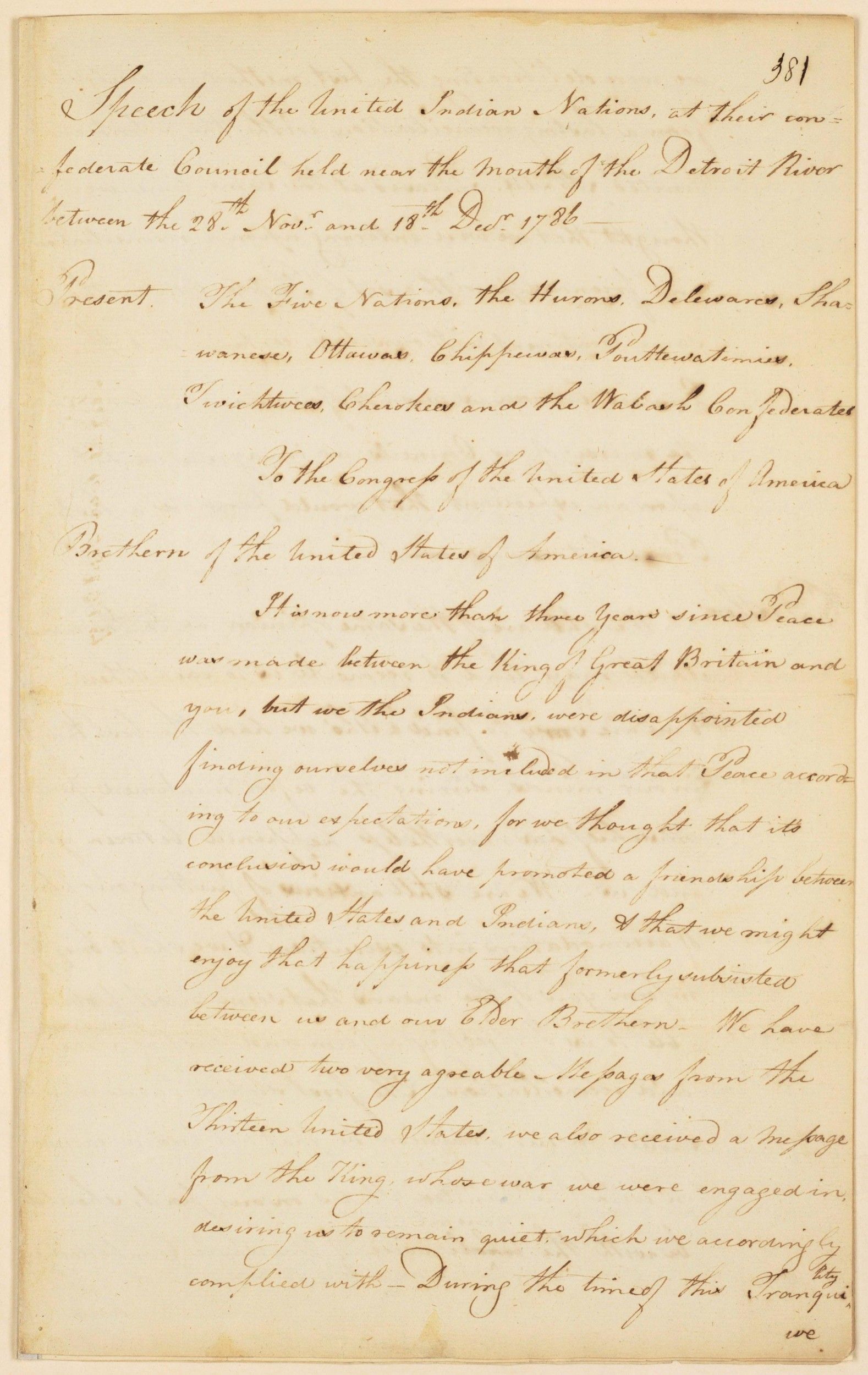
Speech of the United Indian Nations at their Confederate Council
Page 2
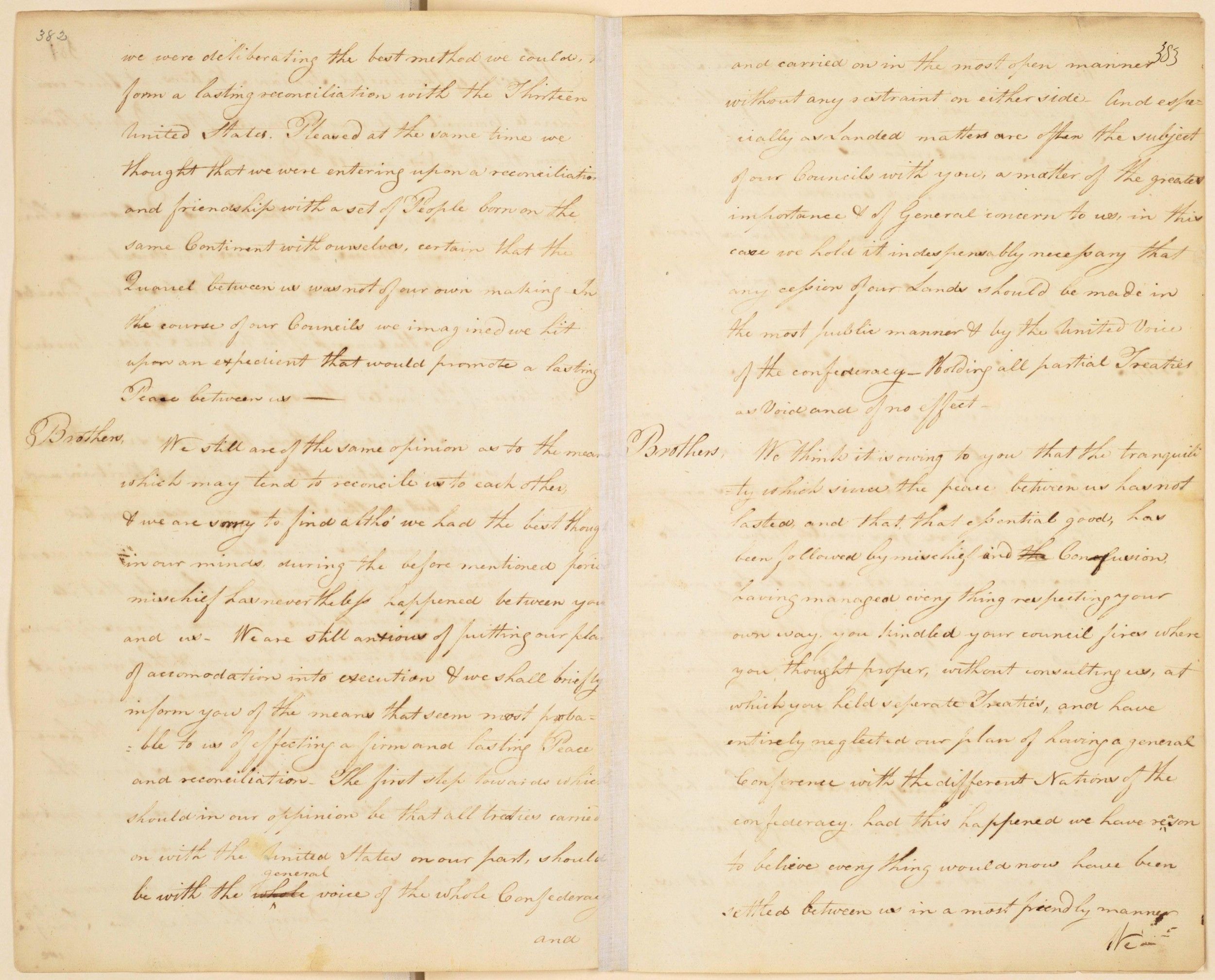
Speech of the United Indian Nations at their Confederate Council
Page 3
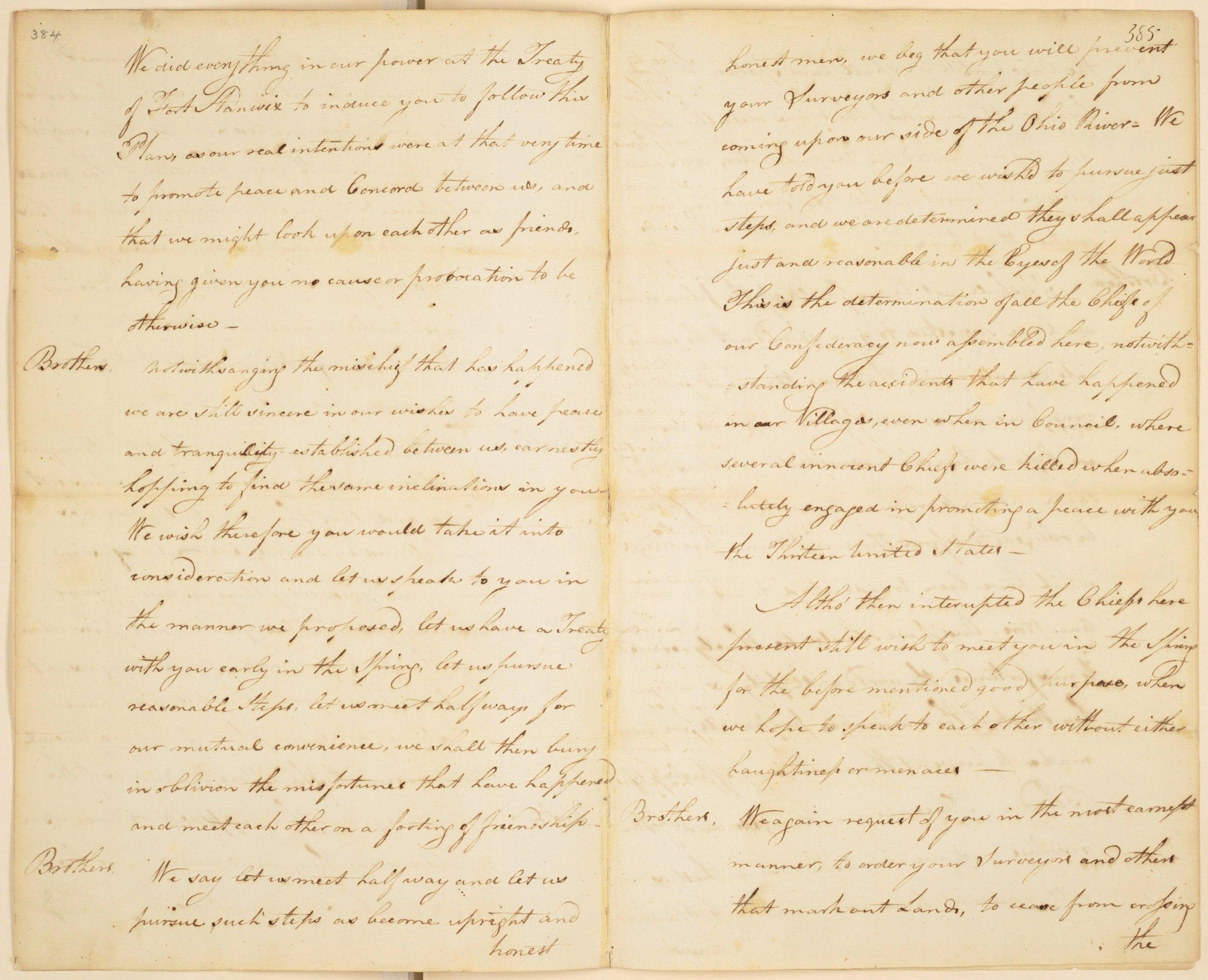
Speech of the United Indian Nations at their Confederate Council
Page 4
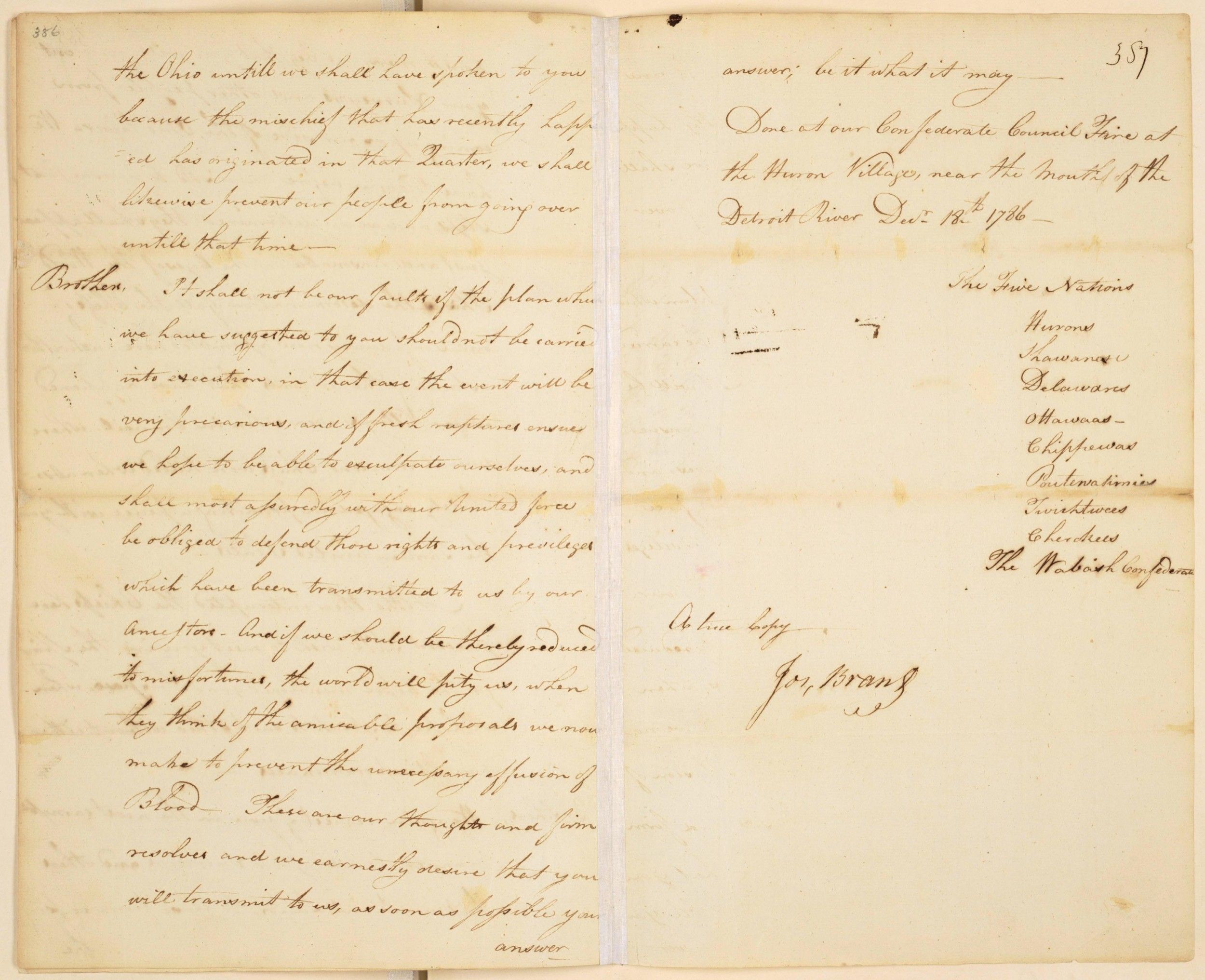
Speech of the United Indian Nations at their Confederate Council
Page 5
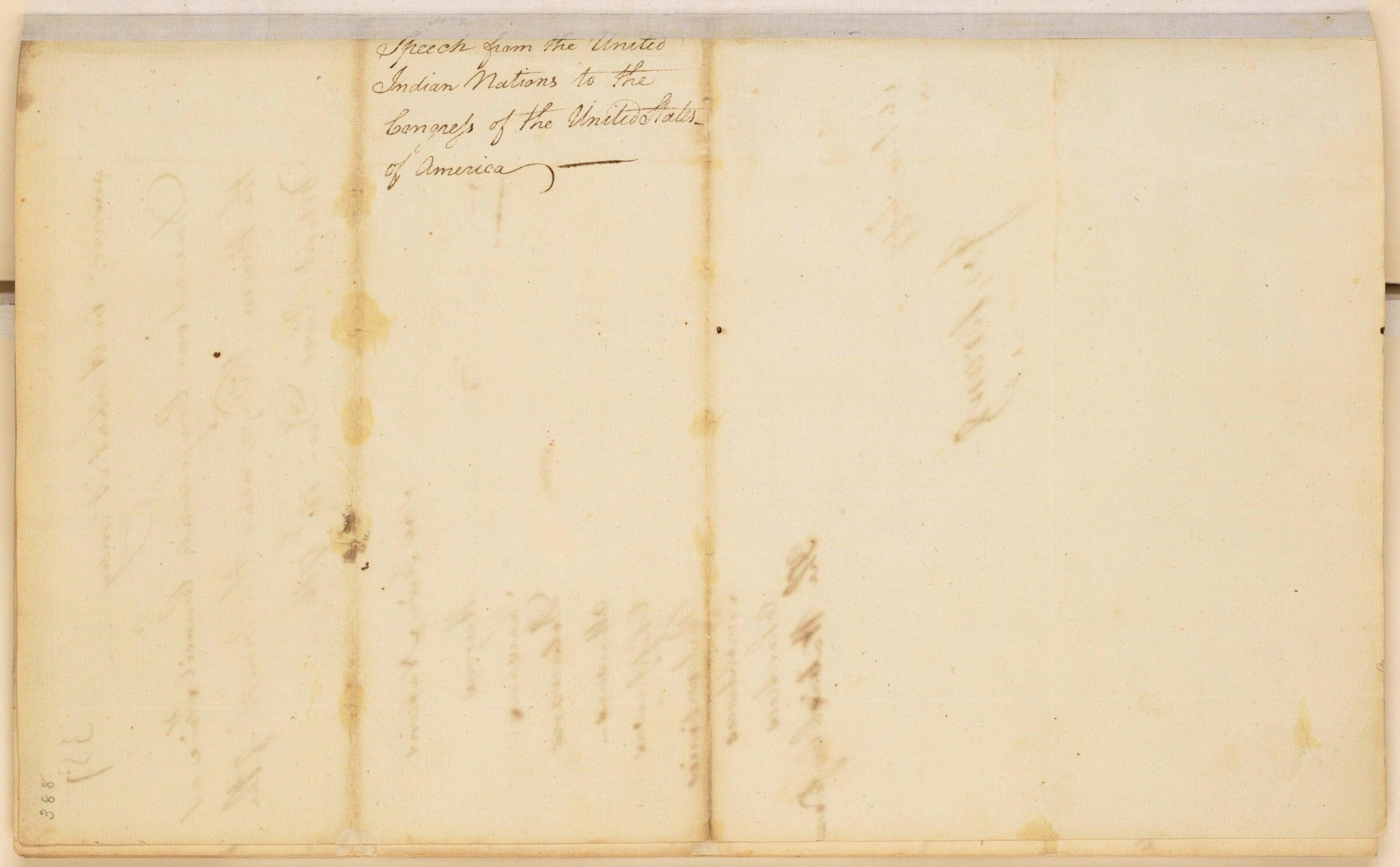
Document
Address by Arthur St. Clair, Governor and Commander in Chief of the Territory of the United States North West of the River Ohio at His Inauguration
7/9/1788
Arthur St. Clair, "Governor and Commander in Chief of the Territory of the United States North West of the River Ohio," gave this speech at his inauguration. It was copied from an enclosure in a letter from Sargent to Thompson on January 15, 1789.
Transcript
Enclosed: 1789 Jan 13, Sargent to Thompson 6075-6084 (Encl. to 6074) Copied 67.Journal of the Proceedings of His Excellency Arthur St Clair Esq. Governor & Commander in Chief of the Territory of the United States North West of the River Ohio.
[horizontal line]
On Wednesday the 9th of July 1788 His Excellency arrived at Fort Harman & on the 15th was published the Ordnance of the honourable Congress for the Government of the Territory - The Commissions of the Governour, the honourable Judges Samuel Harden Parsons, James Mitchell Varnum, and the Secretary’s – after which His Excellency addressed the People assembled at Marietta, as follows –
From the ordinance for the Establishment of Civil Government in this Quarter, that has been just now read, you have a Proof Gentlemen of the Attention of Congress to the Welfare of the citizens of the United States how remote ever their Situation may be.
A good Government well administered is the first of Blessings to a People – everything desirable in Life is thereby secured to them, & from the Operation of wholesome & equal Laws, the Passions of Men are restrained within the Bounds – their Actions receive a proper Direction, the Virtues are cultivated & the beautiful Fabric of civilized Life is reared & brought to Perfection.
The Executive Part of the Administration of their Government has been entrusted to me, & I am truly sensible of the Importance of the Trust, & how much depends upon the due Execution of it – to you Gentlemen over whom it is to be immediately exercised! To your Posterity! Perhaps to the whole Community of America! - Would to God I were more equal to the Discharge of it! But my best Endeavours shall not be wanting to fulfil the Desire and the Expectations of Congress, that you may find yourselves happy under it, which is the [revert?] way for me, at once, to meet their approbation, & to render it honourable to myself; Nor, when I reflect
upon the characters of the Men under whose immediate Influence & Example this particular Settlement, which will probably give a (sp?)to all that may succeed it, will be formed, have I much Reason to fear a Disappointment. Men who duly weigh the Importance to Society of a Strict attention to the Duties of Religion & Morality; in whose Bosoms the Love of Liberty & of Order is a masterly Passion; - who respect the Rights of Mankind, & have sacrificed much to support them, & who are no strangers to the Decencies & to the Elegancies of Life. I esteem it also a singular happiness to you and to me that the Gentlemen appointed to the Judicial Department are of such distinguished Characters & so well known to you – on one side the Respect which is due to their Stations is secured; whilst on the other it will be yielded with the most perfect good will.
You will observe Gentlemen, that the System which has been formed for this Country & is now to take effect is temporary only – suited to your Infant Situation, & is to continue no longer than that State of Infancy shall last: during that Period the Judges, with my Assistance are to select from the Codes of the Mother States such Laws as may be thought proper for you. This is a very important part of our duty, & will be attended to with the greatest care – But Congress have not wholly entrusted this great Business to our Prudence or Discretion,
& here again you have a fresh Proof of their Paternal Attention. – We are bound to report to them all Laws which have be introduced & they have reserved to themselves the Power of annulling them – so that if any Law not proper in itself, or not suited to your Circumstances, either from our not seeing the whole extent of its Operation, or any other circumstance should be imposed it will be immediately repealed. But with all the Care & attention to your Interest & Happiness that can be taken, you have many Difficulties to struggle with – The subduing a new Country, notwithstanding it’s natural advantages, is alone an arduous Task:- a Task
however that Patience & perseverance will surmount & These Vurtues so necessary in every situation, but peculiarly so in yours, you must resolve to exercise – neither is the reducing a Country from a State of Nature to a State of Civilization so irksome as it may appear from a right or superficial view – even very terrible Pleasures attend it;- the gradual progress of Improvement fills the mind with delectable Ideas – Vast Forests converted into arable Fields, & Cities rising in Places which were lately the Habitation of wild Beasts give Pleasure something like that attendant on Creation, if we can form an Idea of it – The Imagination is ravished, & a Taste communicated of the “Joy of God to see a happy World.”
The advantages however are not merely imaginary – situated as you are in the more temperate climate, favour’d with the most fertile soils; surrounded by the noblest & most beautiful Rivers, every Portion of Labour will meet it’s due Reward; But you have upon your Frontiers numbers of savage and, too often, hostile Nations – against them it is necessary that you should be guarded, & the measures that may be thought proper for that End, tho they
may a little interrupt your usual Pursuits, I am certain will be cheerfully submitted to. – One mode however I will at this Time venture to recommend, which as it is in every Point of View the easiest & most eligible so I am persuaded it will be attended with much success – Endeavor to Cultivate a good Understanding with the Natives, without much Familiarity. Greet them on all Occasions with Kindness & the strictest Regard to Justice, Turn not into their Customs & Habits, which is but to frequent with those who settle near them, but Endeavor to induct them to adopt yours. Prevent, by every means, that dreadful Reproach, perhaps too justly brought by them against all the People they have been yet acquainted with. That, professing the most holy & benevolent Religion.
They are uninfluenced by its Dictates & regardless of its Precepts – Such a conduct will produce on their parts the utmost Confidence – They will soon become sensible of the superior advantages of a State of civilization – They will gradually lose their present manners & a way be omened for introducing amongst them the Gospel of Peace, & you be the happy Instruments in the Hand of Providence of bringing forward that time which will surely arrive, when all the Nations of the Earth shall become the Kingdom of Jesus Christ.
The present situation of the Country calls for attention in various places & will necessarily induce frequent absence both of the Judges & myself from this delightful spot, but at all times and Places it is my indispensable Duty, as it is very much my Desire to do every thing within the Compass of my power for the Peace, good Order & perfect Establishment of the Settlement - & as I look for, not only a cheerful Acquiescence in & Submission to, necessary measures but a cordial Cooperation, so I flatter myself my weal meant Endeavors will be accepted in the Spirit in which they are rendered, & our Satisfaction will be mutual and complete.
[horizontal line]
[Following is the beginning of a different document, the beginning of which was written on the last page of the Address by Arthur St. Clair.]
6075 [in a different hand] Copy of a Letter to the Judges
upon the Subject of a Militia Law.
Fort Harman July the 18th. 1788
Gentlemen
I have looked over the proposed law for establishing the Militia, & I have some Objections to it in its present Form, which I have take the Liberty to detail. __ In the Title Page it ought not to be styled the Militia Law of the Unites States — if there Words “United States” were expunged the Title would be well enough. __ The enacting
This primary source comes from the General Records of the Department of State.
National Archives Identifier: 6207450
Full Citation: Address by Arthur St. Clair, Governor and Commander in Chief of the Territory of the United States North West of the River Ohio at His Inauguration; 7/9/1788 ; Northwest Territory, July 13,1787 - August 1, 1791; Territorial Papers, 1789 - 1873; General Records of the Department of State, ; National Archives at College Park, College Park, MD. [Online Version, https://www.docsteach.org/documents/document/stclair-inaugural, April 25, 2024]Address by Arthur St. Clair, Governor and Commander in Chief of the Territory of the United States North West of the River Ohio at His Inauguration
Page 1
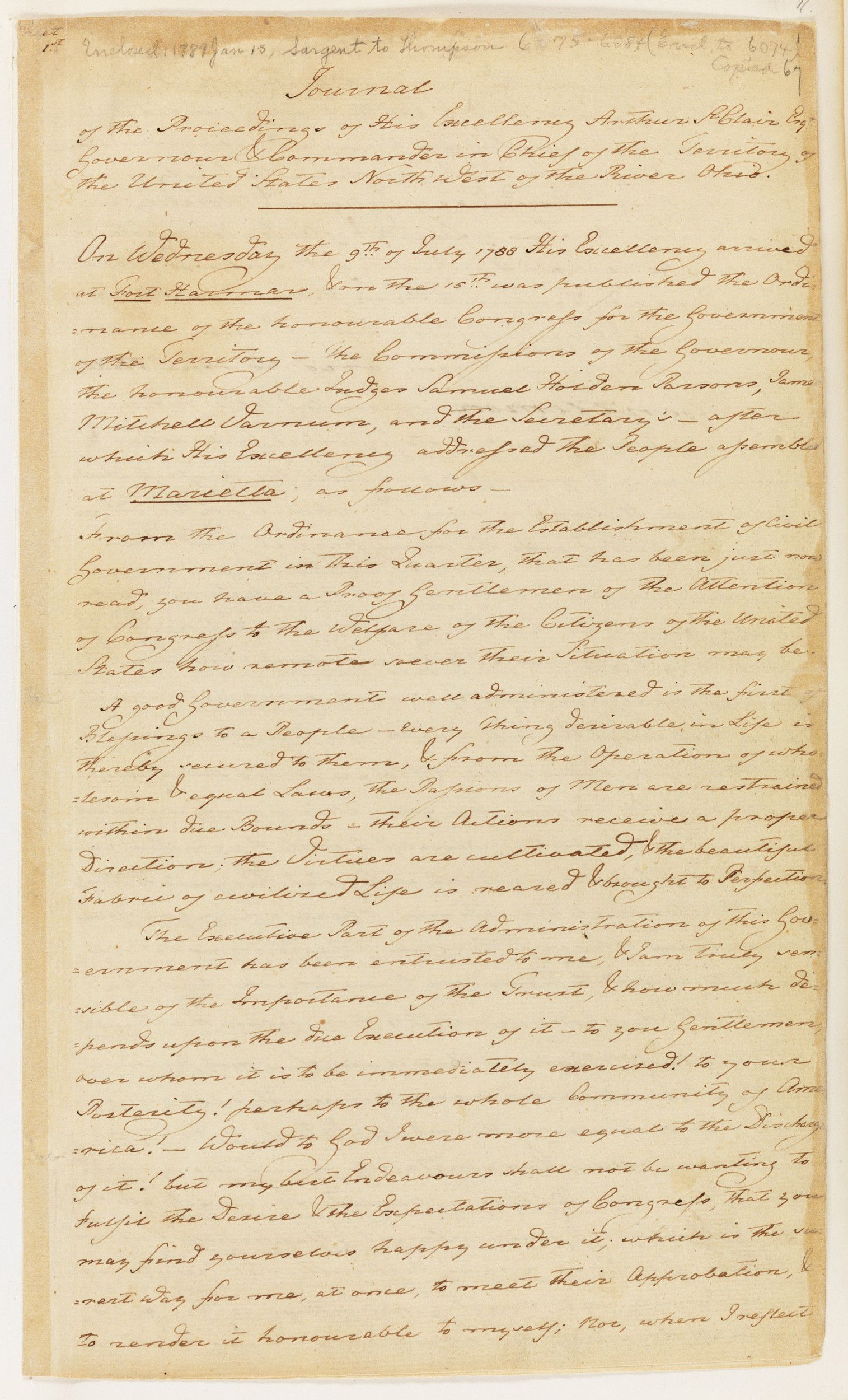
Address by Arthur St. Clair, Governor and Commander in Chief of the Territory of the United States North West of the River Ohio at His Inauguration
Page 2
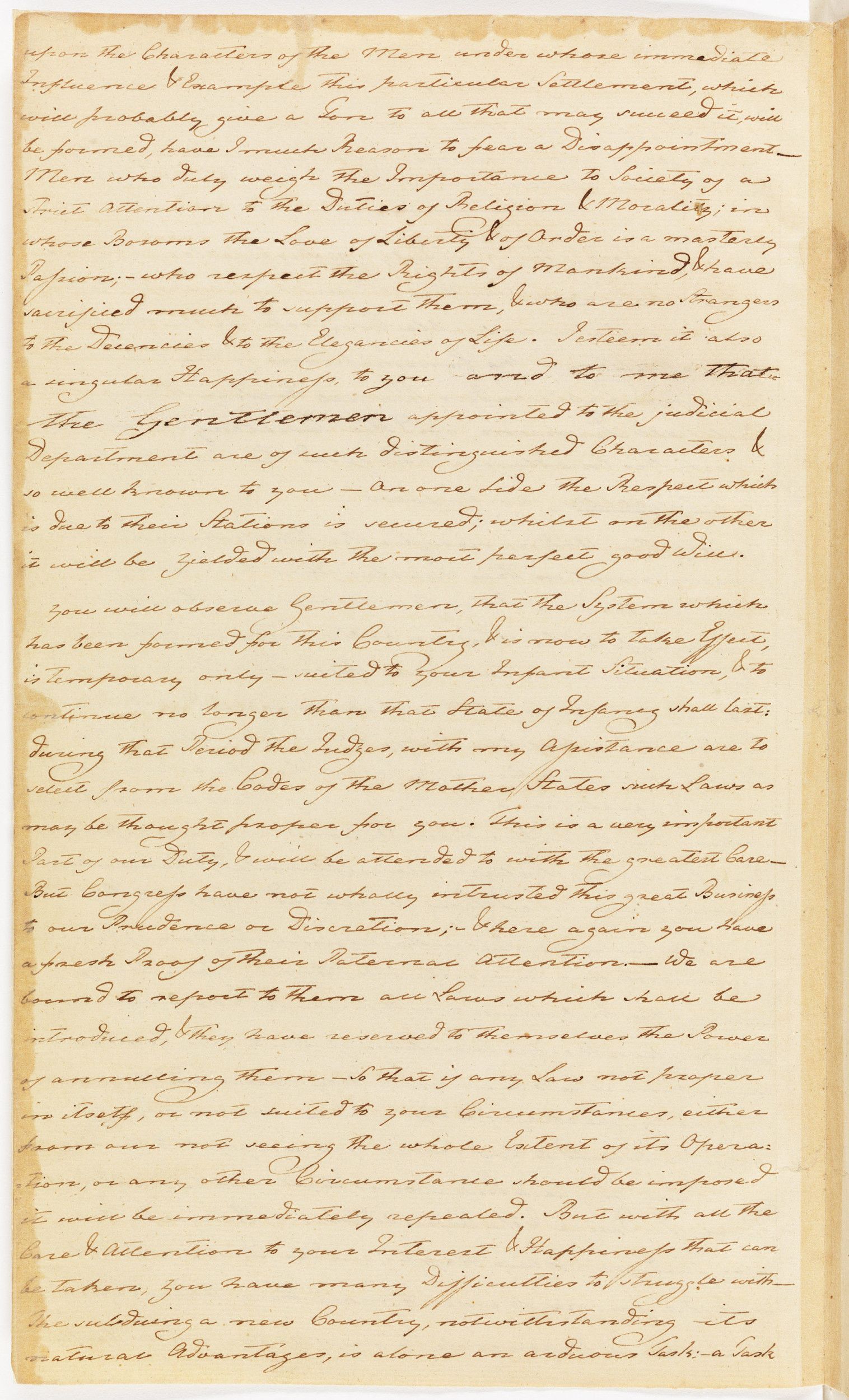
Address by Arthur St. Clair, Governor and Commander in Chief of the Territory of the United States North West of the River Ohio at His Inauguration
Page 3
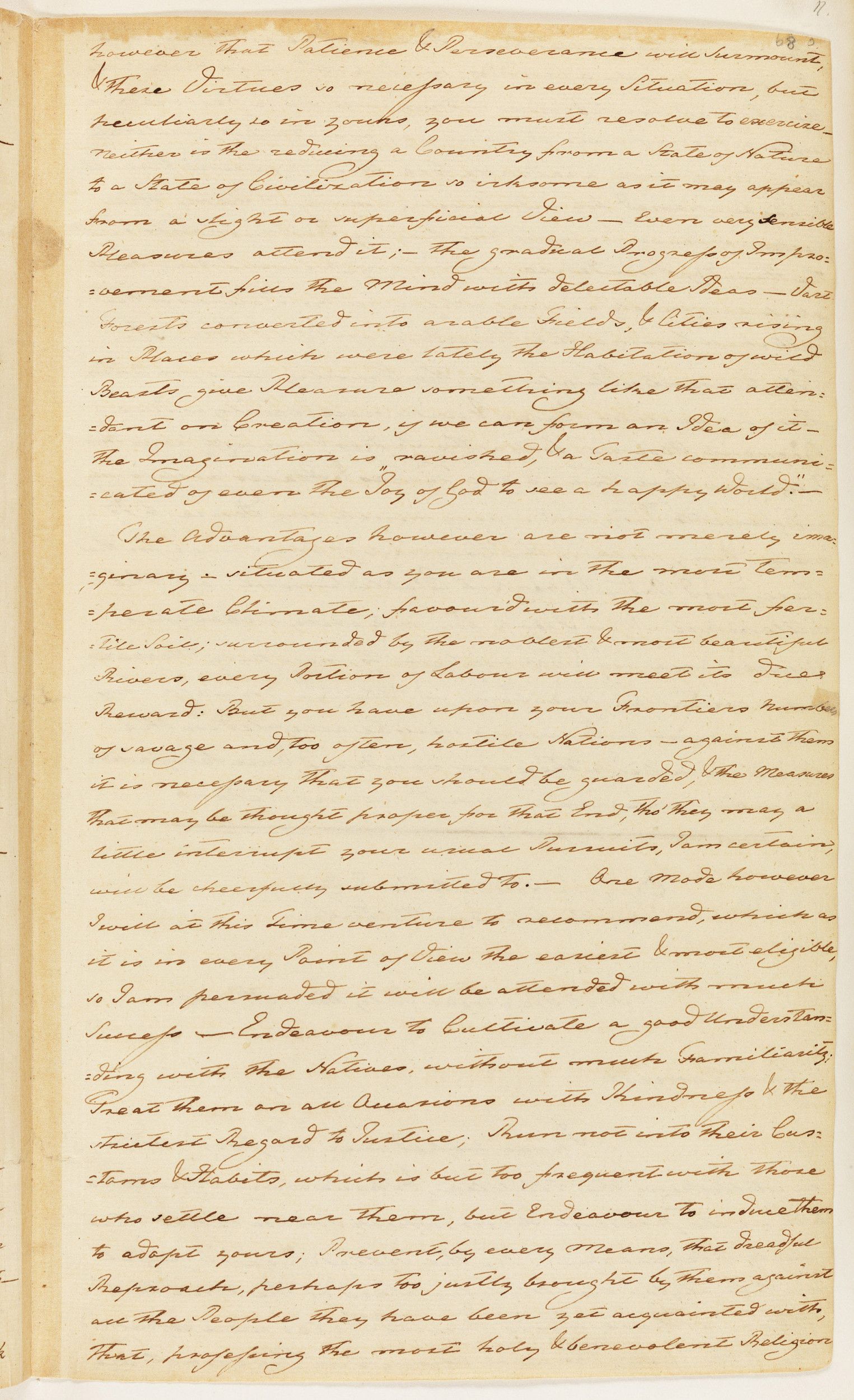
Address by Arthur St. Clair, Governor and Commander in Chief of the Territory of the United States North West of the River Ohio at His Inauguration
Page 4
